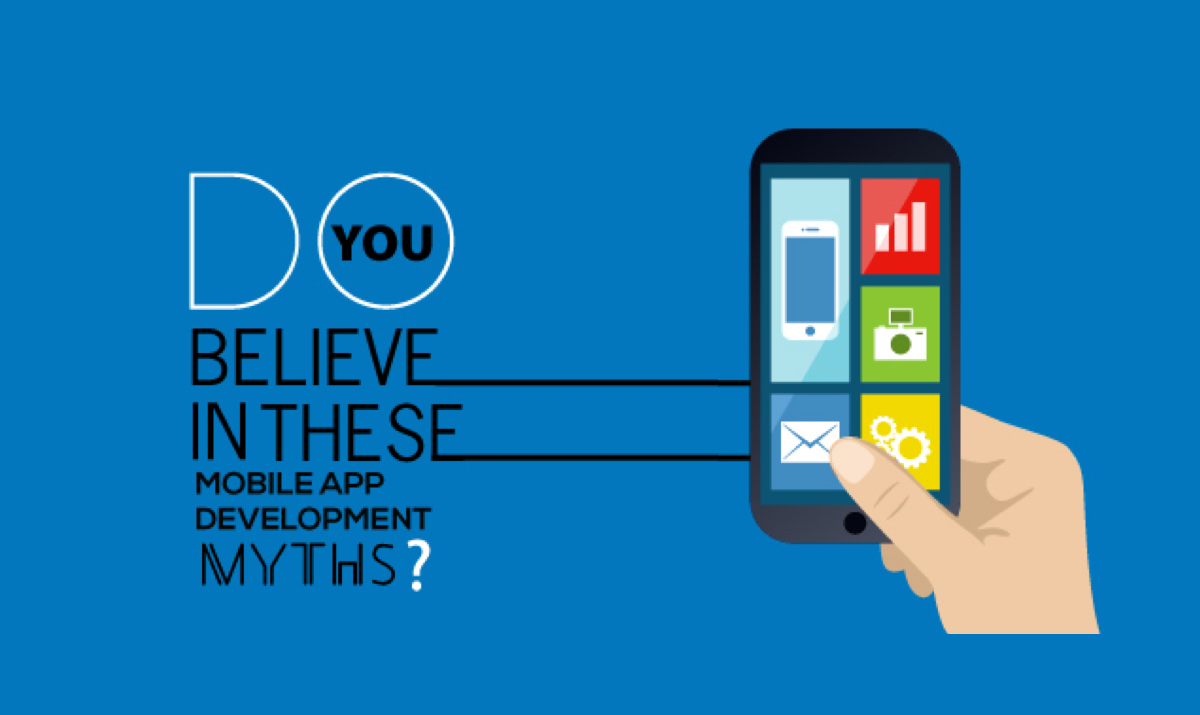Most common myths about mobile app development
Mobile applications have been around since 1980's. As far back as mobile applications were first introduced with the world, its market has developed. Presently, the coordination of IoT and mobile applications is soon going to take us on a ride where everything can be associated with everything.
However, people have many wrong ideas about developing a mobile app. Most of the people think that mobile app is just like a mobile website that they can easily create by using some pre-built modules and frameworks provided by third-party platforms. But the reality is very different. Any experienced app developer or app user knows it very well that everything is not as beautiful as it seems when it comes to matching up the imagination of the mobile apps.
Myth #1
Why so long? – It takes just few days to build the first phase of an app.
Reality
Developing a mobile app is not a simple thing. It’s an ongoing and rigorous process that should imbibe a perfect strategy to begin with. The first phase of a mobile application will take hours, weeks, or maybe months to make it ready as per your requirements. In this manner, you should give maximum possible time; otherwise, hastily may lead your application towards failure.
Myth #2
You should always provide a native app for a better experience.
Reality
Mobile applications arrive in a couple of flavors: Native, hybrid, and mobile web (regularly called a "HTML5 application"). Each type has its points of interest and detriments.
The issues emerge when you pick one write without considering your requirements and your users or audience.
For example, many accept that a local mobile application conveys the best mobile experience. In some cases, that's true. In different cases, the native approach might be the most exceedingly terrible decision.
Instead of simply go the native application course, consider your audience. At the point when and for what reason do they utilize the application? What are they trying to achieve? At exactly that point will you know which improvement technique to pick.
Myth #3
A well-designed app will earn 5 star rating in the App Marketplaces.
Reality
It's not required that an application which is well-designed will get the great reviews and ratings. Many elements including functionalities, features, look and feel, legitimate testing, advertising and support and upkeep contribute toward making an application fruitful. In this way, to make an application successful, you have to consider every single factor carefully.
Myth #4
Mobile app development is a costly affair.
Reality
This is the most latent myth that people hold. The cost of your application is dictated by the quantity of functions you need it to perform. The greater clarity you have on what you need the lesser it is going to cost you.
Mostly decision makers get failed to see mobile application as an problem solver. Along these lines, they wind up paying for functionalities they don't require.
After some time, Most of the mobile app developers/agencies have grown in stabilizing and finalizing the cost of mobile applications..
Myth #5
Too many features make an app successful.
Reality
It's one of the most regular myths that organizations frequently get excited about having many amazing features in their mobile application. However, actually it's not the feature that could just choose the success of an application. In this way before adding any new feature to your application, dependably make these inquiries to yourselves or your decision making team:
● How this feature will benefit my customers?
● How this feature will help to solve the user’s problems?
● How this feature will make things easier for the users?
Myth #6
Users will need an internet connection for app to work.
Reality
No, they don’t. It’s you who defines how your app is going to work. Applications can work offline. Depending on the requirement, data can be synced to backend once the user is connected to a network.
Myth #7
Mobile applications reach users on their own.
Reality
Uploading an application into the application-marketplaces (
Google Play,
Apple App Store,
Windows Store) doesn't mean the work is done. The application needs to get to the phones, tablets and different gadgets of individual users. This is a major challenge for advertisers. Since the competition is huge, getting another application to individuals is an overwhelming undertaking. It requires significant effort and frequently a often a lot of money.
Myth #8
Applications are for Smartphone only.
Reality
Smartphone market is booming but it doesn’t states that apps are only for it. Apps are also useful for other devices like tablets and wearable devices. Technology is getting advanced day by day. Whether it’s a smartphone, table or smart watches hardly matters, the thing which matters is the accessibility of the apps on all the devices.
Myth #9
You must have technical knowledge before you develop an app for your business.
Reality
Obviously, you need the learning of operating a cell phone at the same time, that is all you have to know actually.
As a chief or decision maker, you characterize the issue and how you anticipate that the mobile application will solve it. In the event that you found a solution to this, a fast short to your developer or an organization can give a reality check on technical feasibility of your idea.
Myth #10
Mobile app development is all about writing code.
Reality
A lot of myths about mobile application development stem from misunderstanding the changing nature of the technology market. A few years ago when the market for mobile apps was just emerging, launching an app and getting people to download it was relatively easy. All you needed to do was write a bit of good code and design some nice screens.
Today, developing a successful app takes more than just a bit of knowledge about iOS and Android technologies. Entrepreneurs are looking to build solutions that will bring them a return on investment (ROI).
The way apps generate revenue varies across industries. In app development, it's hard to make the right guess about whether an app is capable of generating revenue until it appears on the market.
App developers must understand not only programming technologies but also must understand the market to ensure ROI for mobile apps. Capturing the interest of consumers takes much thought and a careful strategy.
Today's app development is about creating successful products. Successful products are built through continual improvement, refining growth strategies, and measuring results.
Myth #11
The only idea is everything.
Reality
A lot of aspiring entrepreneurs believe that ideas are the key to success. It's a hard truth to bear, but ideas are worthless on their own. What matters is how you breathe life into those ideas.
There are three factors that app developers need to consider when looking to build a sustainable product that's capable of generating revenue. They are:
● The right timing
● The right market
● The right place
But product/market fit is about discovery, not certainty. It's like playing roulette. For example, if Twitter continued building features to support their early audience—status-updaters—they would have missed out on much larger markets.
Developing a mobile application for your business is a smart thought yet remembering these myths will help you to understand the genuine situation of mobile application development. Likewise, it will set you up to concentrate more on enhancing the quality of your mobile application.
If you have more misconceptions that people have with regards to mobile app development then you can let us know in the comment section.



0 Comment
Leave A Reply